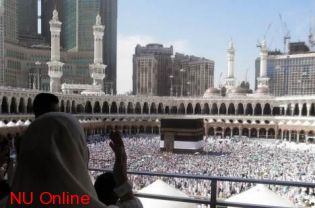Mecca, NU Online
Muslim pilgrims are descending in droves on Mecca for the hajj, the world's largest annual gathering which Saudi Arabia insists will not be affected by instability rocking the region, AFP reportd.<>
Led by guides with their countries' flags printed on their garments, the faithful poured into Mecca to perform the minor pilgrimage, or umrah, ahead of the major hajj rituals.
Officials say the main events, which begin Wednesday, are expected to attract more than two million devotees from across the world.
Thursday is the most important day, when pilgrims assemble in the Arafat plain outside Mecca. The pilgrimage ends after Idul Adha, or the Feast of Sacrifice, on Friday.
The hajj is one of the five pillars of Islam that every capable Muslim must perform at least once.
"It's my first time in Mecca for pilgrimage. I can't wait to pray in Arafat," said 32-year-old Koara Abdulrahman, a businessman from Burkina Faso.
Inside the Grand Mosque, also known as Masjid al-Haram, scores of pilgrims circumambulate the cube-shaped Kaaba — in which direction Muslims worldwide pray — with many pushing their way through the crowds to kiss the walls of the structure that was first built by Abraham, according to the Islamic faith.
Others pray or recite verses from the holy Koran.
"Right now, I've got all the good feelings you can think of," said an Iranian pilgrim, her voice quivering and tears welling.
Authorities said more than 1.6 million foreign pilgrims have already arrived and the numbers are set to grow by Wednesday. Some 750,000 domestic pilgrims are also expected for the rituals.
Despite several checkpoints on roads to Mecca to prevent illegal pilgrims, huge numbers of unauthorized devotees also join the hajj every year.
A large number of pilgrims are from Asia, mostly from Indonesia which has the highest hajj quota, being the world's most populous Muslim nation.
It was unclear how many people from Syria, rocked by a civil war that began with a popular uprising against President Bashar al-Assad's regime 19 months ago, will make the journey.
Damascus said in September that Saudi authorities have barred Syrians from this year's hajj after the two sides failed "to reach consensus."
But on Saturday Saudi Interior Minister Prince Ahmad bin Abdul Aziz insisted Syrian pilgrims were not barred, except those who applied too late for hajj visas.
The Saudi envoy to Lebanon said last week that the kingdom will also grant visas to Syrians in Lebanon, Turkey and Jordan, where thousands of refugees who have fled the violence are being accommodated.
On Sunday, state news agency SPA said 10,000 visas have been granted to Syrian refugees in those three countries.
Prince Ahmad also warned that Riyadh will not allow the hajj to be "politicized."
He told reporters the kingdom was not worried that trouble in Syria and other Arab countries could affect the hajj or that pilgrims from its regional arch-foe Iran would cause any disturbance.
"I don't expect pilgrims or the pilgrimage to be affected by what is taking place elsewhere, whether in Syria or any other place," he said.
"We don't expect any" unrest by Iranians, he added.
Iranian pilgrims annually stage a "repudiation of polytheists" rally — a ritual promoted by the late Islamic republic's revolutionary leader Ayatollah Ruhollah Khomeini to denounce the West and Israel.
In 1987, police attempts to stifle the anti-US and anti-Israeli demonstration sparked clashes in which 402 people died, including 275 Iranians.
Iranian pilgrims have since held their rallies in tents without provoking clashes with security forces in the Sunni-dominated kingdom.
"The Iranians have assured us that they are as concerned about the comfort of pilgrims as we are," Prince Ahmad said.
Heavy rain hit Mecca on Sunday, and the civil defense said 13 people were lightly injured when a fire erupted in a building housing Indian and Burmese pilgrims.
Despite being marred by deadly incidents in the past such as floodings, stampedes and fires, the hajj has become nearly incident-free in recent few years, thanks to multi-billion-dollar projects being implemented every year.
This year alone, the kingdom spent more than 1.1 billion riyals ($293.3 million) on development projects in the holy sites of Mina, Arafat, and Muzdalifah, all outside Mecca.
Editor : Sudarto Murtaufiq
Terkait
Terpopuler
1
Disambut Ketum PBNU, Presiden Prabowo Hadiri Mujahadah Kubro Harlah 100 Tahun NU di Malang
2
Resmi Dikukuhkan, Ini Susunan Pengurus MUI Masa Khidmah 2025-2030
3
1.686 Warga Padasari Tegal Mengungsi, Tanah Bergerak di Tegal Masih Aktif
4
Ratusan Ribu Warga Dikabarkan Bakal Hadiri Mujahadah Kubro 100 Tahun NU di Malang
5
Pemerintah Nonaktifkan 13,5 Juta Peserta PBI JKN, Mensos Gus Ipul: Dialihkan ke Warga Lebih Miskin
6
Ansor University Jatim Buka Pendaftaran Ramadhan Academy, Tiga Kelas Intensif Gratis
Terkini
Lihat Semua



